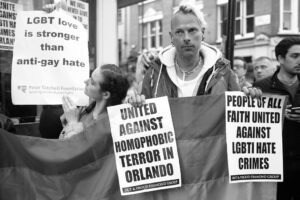
What did Christ teach us? He taught us to be kind and love each other. ““Teacher, which is the greatest commandment in the Law?” Jesus replied: “‘Love the Lord your God with all your heart and with all your soul and with all your mind.’ This is the first and greatest commandment. And the second follows: ‘Love your neighbor as yourself.’ All the Law and the Prophets hang on these two commandments.”(Matthew 22:36-40).1 There are no exception to this law. All humans living in this world should be treated in the way that you would want to be treated. Not only this, but we should treat people the way we want our family and friends treated as well. Every human being has a mother, father, relatives, friends, and meaningful connections to other humans. When you hurt someone you not only hurt the person but you also hurt the people who care about that person. Judging, hurting, or targeting someone for who they are seems explicitly against the commandments: there were no restrictions on who the neighbors were. Having someone you love and who loves you in return is an amazing feeling that every human should have the opportunity to experience. Being a part of the LGBTQ+ community and coming out has become a more common occurrence for Gen Z than in the past. People can be themselves publicly with no criticism or rejection. Did you believe that last sentence? I wish it were the case. There are many people who have become accepting and open with the LGBTQ+ community, but there are also some who feel strongly about rejecting the LGBTQ community and standing against it. In a paradoxical way, as acceptance grows, trolling, retaliation, and attacks grow in violence and frequency through social media platforms. Certainly loving and respecting our neighbor as ourselves could never have meant to hate or threaten other humans or their families. Remember, if you threaten someone you are also disrespecting the people who care about that person. Every action has consequences. Harming someone for their sexual preferences can destroy other people’s lives. For those who do not follow God’s commandments seriously, as not earthly “laws” to follow, there are national and international legal documents that protect the safety and rights of the LGBTQ+ community. For example, the 1948 Universal Declaration of Human Rights have played a crucial role in advancing LGBTQ+ rights globally. The issue is the enforcement of these rights when facing cultural and political challenges. I intend to evaluate the effectiveness of what has been set in place and assess how it impact LGBTQ+ communities safety and equal rights.
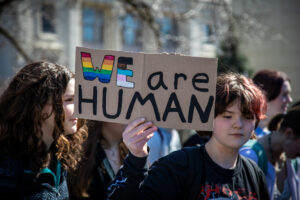
In the 1900s, men and women who were suspected homosexual behaviors or tendencies were labeled mentally ill. Therapists would offer aversion therapy which entailed showing nude pictures of the same sex and using electric shock or drugs to make them sick, then when they can’t bear it anymore show them pictures of the opposite sex in order to “fix” their homosexuality.2 In 1973, the American Psychiatric Association issued a resolution that stated homosexuality was not a mental illness. This shift alone could not transform all attitudes to accepting LGBTQ individuals unfortunately.3 It supported “civil rights legislation at local, state, and Federal levels to insure homosexual citizens the same protections now guaranteed to others,” as stated in the resolution.4 The community welcomed this change considering the alternative of being declared mentally ill and worse if one suffered through aversion therapy. However, this change also brought danger for those who lived openly in their truth. Some hateful people targeted LGBTQ individuals to unleash hatred. It can be hard to appreciate the difference between the 1900s and today. Back then people hid their sexuality, or got sent to aversion therapy. Neither option is desirable. No matter what, you were either hiding your true self or being punished and seen differently for being who you are. Today, more people are open with their sexuality. And the persecution and oppression LGBTQ has moved into social media space that created a platform for people to send hateful messages with no consequences. One need not even reveal who they are by creating fake accounts to bombard others with hateful messages. Social media not only allows for private vitriolic hate, but also fosters public shaming and belittling. People have become extremely vocal on social media thanks to the lack of accountability. Comments, videos, pictures, fake accounts, rewarding people who relentlessly produce hate from the comfort of their home. Online criticisms have a negative impact on the LGBTQ+ community, but it goes much further when it emboldens groups to act out persecution in public. Being a part of the LGBTQ+ community automatically makes you four times more likely to be a victim of a violent crime.5 The constant discrimination seems to never end. Simple tasks such as eating in a restaurant, going shopping, or using the bathroom could be a problem for people. No one should be scared to live or fear judgement for who they are. How has it come to the pint that someone bestow violence and malice towards LGBTQ+. Being different does not make any human evil, each person is special. Instead of hating for not being the same, we need to embrace our differences and work on self love and happiness. Unfortunately, it is not as easy as it sounds. it can be hard to embrace who you are when you could be killed for being LGBTQ in so many other parts of the world.
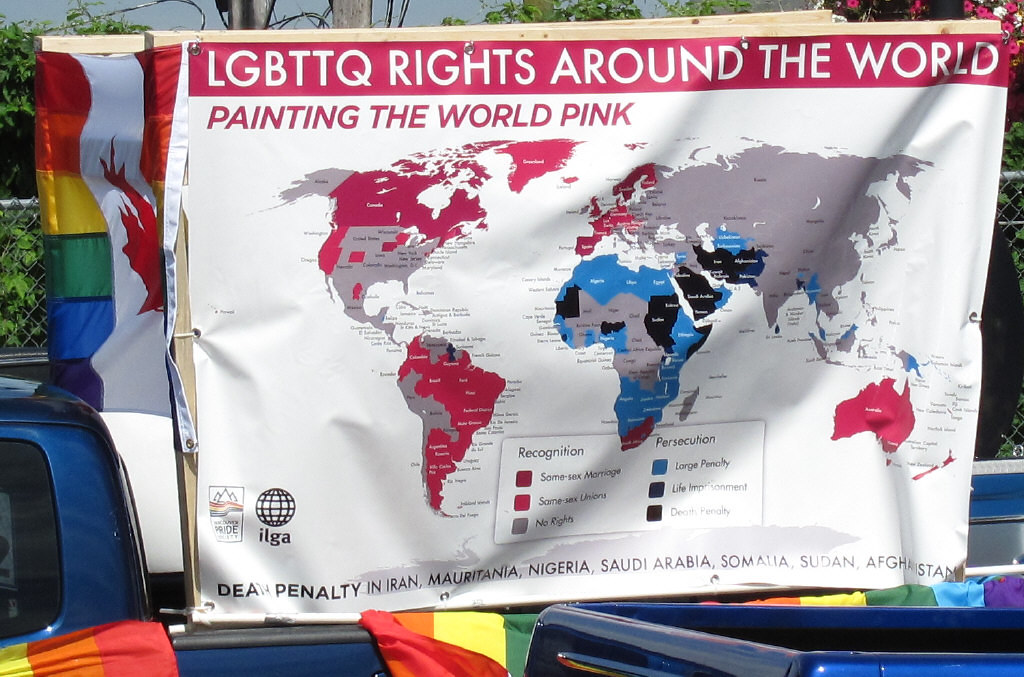
Several countries target the LGBTQ individuals directly by revoke any rights or protections. 65 countries passed laws that criminalize the LGBTQ+ community. Just on the Asian Continent, 22 countries punish belonging to the LGBTQ+ community. 31 countries outlaw homosexuality in Africa, 6 countries in the Caribbean and the Americas, and 6 more made it illegal in the Pacific. In Afghanistan, homosexuality received death. Punishment ranges from years in prison, to torture, to the death penalty, or some combination.6 Governments might only protect or enforce certain rights rights. However, rights advocates push for at minimum the recognition of all the provisions enumerated in the 1948 Universal Declaration of Human Rights. The first five articles of the Universal Declaration of Human rights are as followed:
Article 1
All human beings are born free and equal in dignity and rights. They are endowed with reason and conscience and should act towards one another in a spirit of brotherhood.
Article 2
Everyone is entitled to all the rights and freedoms set forth in this Declaration, without distinction of any kind, such as race, color, sex, language, religion, political or other opinion, national or social origin, property, birth or other status. Furthermore, no distinction shall be made on the basis of the political, jurisdictional or international status of the country or territory to which a person belongs, whether it be independent, trust, non-self-governing or under any other limitation of sovereignty.
Article 3
Everyone has the right to life, liberty and security of person.
Article 4
No one shall be held in slavery or servitude; slavery and the slave trade shall be prohibited in all their forms.
Article 5
No one shall be subjected to torture or to cruel, inhuman or degrading treatment or punishment.7
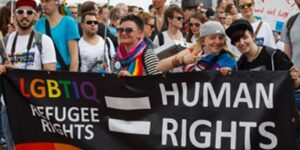
Sexual identity should not be grounds for punishment or revoking rights. These first five articles clearly state that everyone no matter what, has inalienable rights as a human. Yet too often LGBTQ individuals cannot even benefit from basic human rights. What makes the LGBTQ+ community any different from you and me? In the US they make up about 5.5% of the population which represents 13.9 million people.8 The Universal Declaration of Human Rights alone cannot protect the LGBTQ+ community. Powerful people use social media platforms to abuse others with impunity, it sends a message that it is acceptable. Leaders of our countries must consistently enforce these rights. We need to further educate all about the protection all human have. At the end of the day words on a document won’t stop people from doing what they want. We need to be stricter with the way we treat the LGBTQ+ community and anyone who’s discriminated against. The one thing we all have in common is that we’re human. We need to be able to treat everyone like they are human and not like outcasts. Bullying or hurting someone for their differences is not the way to go. We need to treat people like we want want our family, friends, and ourselves to be treated. Someone’s mother, father, siblings, or friends shouldn’t have to deal with the pain of seeing their loved ones get hurt or even killed for being who they are. We, as humans, need to do better. There is no excuse for treating people cruelly. Religion should not serve as an excuse. Remember this commandment and follow it like Christ would want us to, “Love your neighbor as yourself.”
- Matthew 22:36-40 (NIV) (n.d.) Bible Gateway. https://www.biblegateway.com/passage/?search=Matthew%2022%3A36-40&version=NIV. ↵
- Ganesh, Sujan. (2020). Realization of the Rights of LGBTQ+ Community. Supremo Amicus, 19, 560-564. ↵
- In 1973, American Psychological Association (APA) removed homosexuality from its list of illnesses. (2017, December 15). Human Rights Campaign. https://www.hrc.org/news/flashbackfriday-today-in-1973-the-apa-removed-homosexuality-from-list-of-me. ↵
- Discrimination against homosexuals. (n.d.). https://www.apa.org. https://www.apa.org/about/policy/discrimination. ↵
- The Williams Institute at UCLA School of Law. (2020, October 5). LGBT people nearly four times more likely than non-LGBT people to be victims of violent crime – Williams Institute. Williams Institute. https://williamsinstitute.law.ucla.edu/press/ncvs-lgbt-violence-press-release/. ↵
- Team, B. R. C. (2023, March 31). Homosexuality: The countries where it is illegal to be gay. BBC. https://www.bbc.com/news/world-43822234. ↵
- United Nations. (n.d.). Universal Declaration of Human Rights | United Nations. https://www.un.org/en/about-us/universal-declaration-of-human-rights. ↵
- The Williams Institute at UCLA School of Law. (2024, March 20). Adult LGBT population in the United States – Williams Institute. Williams Institute. https://williamsinstitute.law.ucla.edu/publications/adult-lgbt-pop-us/. ↵
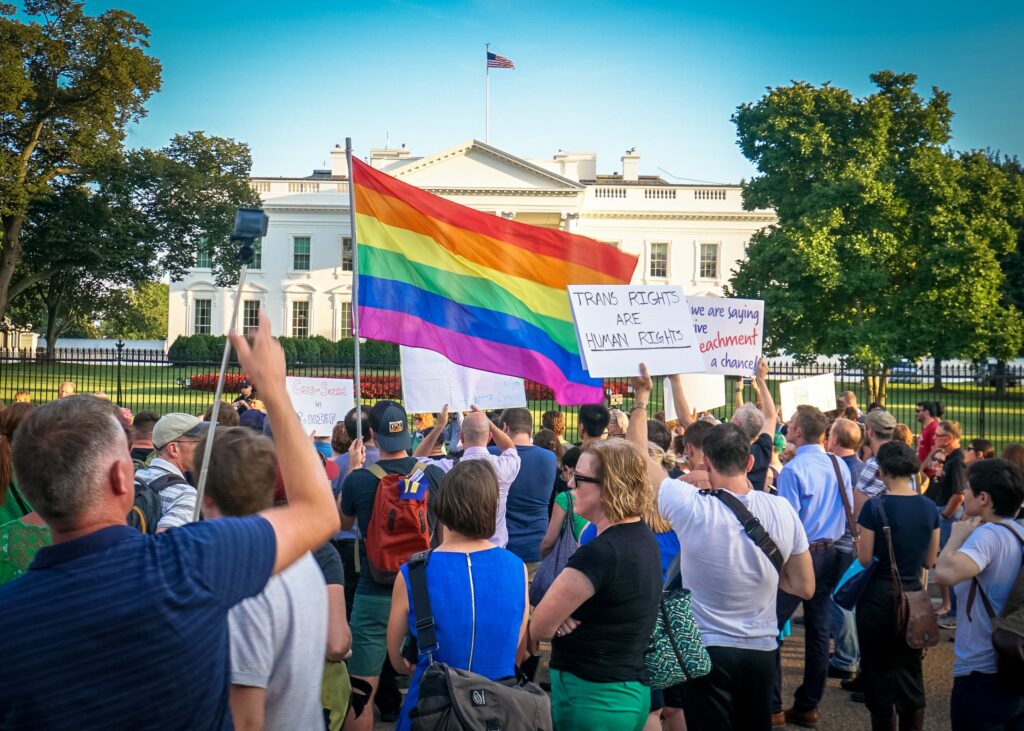


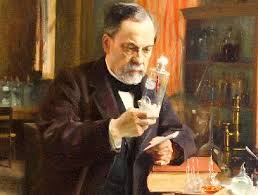
7 comments
Gaitan Martinez
Very inspiring article, and I especially love how the author implemented the bible into the article because it’s a very controversial point. It’s true the bible does say everyone should be treated fairly, then goes on to say, “no man shall lay with another man.” It really pains me to hear stories of people back then having to hide their sexual orientation because they fear what others might do to them! Having to hide your true self must be such a torment, but I’m glad it’s not like that anymore, at least in the majority of the world.
Nicholas Pigott
Hi Lauren! First off, I love your invoking of Christ to start off this article. It’s truly a point among gross bigotry assuming Christ would have approved of discriminating against our neighbor for the harmless act of loving someone of the same gender, or presenting themselves in a way that feels more true to their person than what is expected from society. This is a beautiful and touching article, well done!
Silvia Benavides
I enjoyed reading this article. It offers vital information about what it means to be part of the LGBT community and the legislation that must be done for the protection of people in that community. Wonderful job!
Mariana Chamorro
Lauren, your piece beautifully highlights the significance of compassion and equality, drawing from Christ’s teachings to stress the importance of treating everyone with kindness. Your exploration of the struggles faced by the LGBTQ+ community prompts important reflection on human rights and dignity. Great job!
Sebastian Hernandez-Soihit
Very good article that offers specific information about homosexuality and the legal gaps that still need to be filled in order to protect LGBT individuals from the social issues that put them in danger of violent crime. Good images and sources!
Sebastian Hernandez-Soihit
Pretty good overview of the current standing of LGBT rights and history. Offers specific pieces of legislation and the gaps that need to be filled to provide the legal net to protect LGBTQ individuals from discrimination at the social level. Very good!
LEE
I am very interested in this kind of topic. Thank you for sharing nice article about LGBTQ+ community. I always wanted to have debate about this topic with my friends. It is very interesting topic and essential in our society. I would like to share this with my peers. Through this article i could have got more knowledge about this area. Thank you